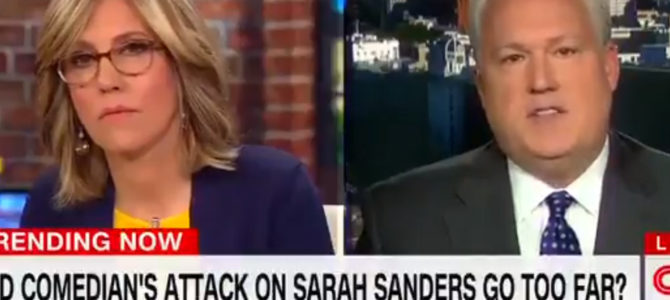
Matt Schlapp, chair of the American Conservative Union, told CNN Monday that “journalists should not be the ones to say that the president or his spokesperson is lying.” This is an absurd statement. Journalists should always be uncovering the lies of the powerful, whether explicitly pointing out falsehoods or by laying out the facts. And that’s the problem. Many voters no longer have faith that the media is doing so fairly or accurately, and they have exceptionally sound reasons to be skeptical.
Schlapp’s comments spurred a flood of sanctimony from journalists, as almost any criticism does these days. But there’s a reason he, and Donald Trump, feel secure demonstrating contempt for journalism. In many ways, it’s the same reason Michelle Wolf feels comfortable making self-righteous jokes about half the country’s beliefs while pretending to speak truth to power. She sees a largely like-minded audience in front of her. And she’s right.
It would be a far better country if the press took a perpetually adversarial approach to those in power — and that shouldn’t be reserved for any one administration or even Washington. I’m not offended that a comedienne at the correspondence dinner mocked an administration hack. I’m offended that they would never let a comedienne mock Josh Earnest or Jay Carney (a supposedly non-biased reporter before he became Obama’s press secretary) in similar ways.
Trump didn’t single-handedly poison the relationship between the press and the people with his exaggerated and aggressive criticism. Rather, he’s taking advantage of decades of frustration and bias. When Sen. Marco Rubio faced a New York Times hit job — like so many other Republicans have before and after him — he did his best to mitigate the damage by appealing to voters with information. Oftentimes it’s too late. Trump, whether a story is true or not, skips the explanation and accuses the press of concocting fictions. A big part of why he gets away with this is that he is often right.
There are always partisans willing to believe conspiracy theories and dismiss evidence, but it’s simply too easy for a conservative — even ones who don’t approve of the president — to juxtapose the obsequiousness of the past eight years with the grandstanding sanctimony of today’s journalists. Call it whataboutism if you like, but holding outlets to the same standards no matter who is in power is perhaps the easiest way to gauge their professionalism.
“If Woodward and Bernstein” had followed Schlapp’s advice, one person noted on Twitter, “history would regard the culprits in the Watergate break-in as just a few rogue operators with no ties to Nixon.” This is inarguably true. The thing is, plenty of people follow Schlapp’s guidance.
They followed his advice when they let President Barack Obama knowingly mislead the country to pass his massive health-care program, and they did it when they let him get away with paying the Iranian mullahs for American hostages, and when they let him subdue criminal investigations to let the terrorists of Hezbollah off the hook, and when they let the heads of his spy agencies leak politically motivated scraps of information to undermine an election.
There is a long list of stories where the Schlapp principle was in play, and they always seem to skew in one direction. Some of those stories only later came to light. Even those that were reported on weren’t treated with the seriousness they deserved. Coverage often reeks of ideology because of the way it is meted out.
It’s actually gotten worse under Trump. We now have a year and half of collusion hysteria to chew over. It was a story that buttressed much of the political coverage, and was meant to cast a perfectly fair election as a seditious plot. Because Trump was involved, a number of outlets could run the same story using “multiple” sources that were wrong in the same exact way. Readers never got an explanation.
Because Trump is involved, Democratic Rep. Adam Schiff, who is on the record lying on numerous occasions, is allowed to drive coverage with leaks, yet Republican Rep. Devin Nunes is constantly portrayed as a villain, despite being proven correct on a number of issues. Both are partisans. Both have agendas. Yet the most prominent political journalists remain skeptical of only one.
If Mueller ends his investigation with no evidence of collusion, few, if any, of the reporters, editors, or executives who pushed these fantasies based on politically motivated leaks to create sensationalistic stories for partisan purposes will pay a professional price. The opposite seems to be true. There are plenty of honest journalists, but it’s usually the loudest, the most misleading, the most uninformed, and the most partisan who are rewarded. In fact, these days, those in the media are often indistinguishable from those in politics.









